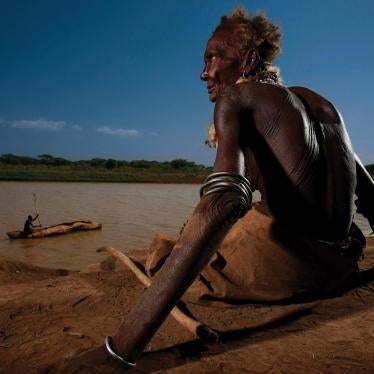(Washington, DC) – The World Bank should ensure that the rights of indigenous peoples and the environment are rigorously protected before funding a power transmission line connecting Kenya to a controversial dam in Ethiopia, Human Rights Watch said in a letter to World Bank President Jim Yong Kim released today. The World Bank’s board of directors is scheduled to meet on July 12, 2012 to consider the project.
The World Bank project has the important goal of improving electrical service to people in Kenya, where more than 80 percent of the population does not have access to electricity. However, the bank has been unwilling to apply the institution’s social and environmental safeguard policies, which are designed to prevent and mitigate undue harm, to the proposed sources of power for the 1,000-kilometer transmission, Human Rights Watch said. The sources include the Gibe III hydroelectric dam in southern Ethiopia, which is scheduled to start operating in 2014. The dam has been linked to serious human rights abuses and environmental concerns.
“The World Bank shouldn’t think that it’s fine to fund a transmission line while closing its eyes to abuses at the power source,” said Jessica Evans, senior international financial institutions advocate at Human Rights Watch. “The rights of hundreds of thousands of indigenous people threatened by the Gibe III dam need to be protected.”
The Ethiopian government is going to use power from Gibe III on the Omo River to supply electricity for 245,000 hectares of state-run irrigated sugar plantations and other projects. The sugar plantations are already having serious consequences for the 200,000 indigenous residents of the Lower Omo including the loss of grazing land and cultivation sites, and forced resettlement into villages. These residents, from eight distinct groups, rely on the 760-kilometer-long Omo River for growing crops and replenishing grazing lands during annual flooding.
The dam and related agricultural plans are also likely to dramatically decrease water levels in Kenya’s Lake Turkana, which receives 90 percent of its water from the Omo River, further increasing competition over scarce resources for the additional 300,000 indigenous people who live around Lake Turkana.
Human Rights Watch has documented abusive relocations of indigenous peoples linked to the creation of the sugar plantations along the Omo River. State security forces have used intimidation, assaults and arbitrary arrests when people questioned the relocations or refused to move.
The United Nations and others have also raised serious environmental concerns about the dam. In 1980 the Lower Omo Valley was named a World Heritage site by the United Nations Economic, Social and Cultural Organization (UNESCO) because of its special cultural and physical significance. UNESCO’s World Heritage Committee has called on Ethiopia to suspend construction of the dam until its adverse impacts on the environment have been properly studied and mitigated.
The World Bank requires that projects it funds follow its policies and procedures to mitigate adverse environmental and social impacts. If a project will result in the loss of livelihood, the bank requires effective consultation with the affected people, adequately compensating them for their losses, and ensuring that they can at least maintain their previous living standards under the new circumstances. When indigenous people are involved, the bank’s policy requires additional procedures to ensure that the consultation, compensation and relocation process respects the cultural and physical needs of the affected community.
The World Bank has undermined these policies and procedures by narrowly construing its responsibilities to the construction of the power transmission line while ignoring the impact of the sources of power that make the transmission line feasible, Human Rights Watch said.
Human Rights Watch called on Dr. Kim and the World Bank’s board of directors to:
· Fully examine the social and environmental impacts of the transmission system before proceeding with this project, including the supply sources for the electricity.
· Rigorously apply its environmental assessment, involuntary resettlement, and indigenous peoples’ policies to the facilities supplying the transmission line.
· Press the Ethiopian government to advance an enabling environment for development in which the rights to freedom of expression, association, and assembly are protected.
· Enhance monitoring and supervision of all projects in Ethiopia.
The World Bank is one of the largest donors to Ethiopia, which receives about one-third of its budget from foreign aid.
Kim took office as the World Bank’s 12th president on July 1. As a physician who has worked with the World Health Organization and nongovernmental organizations to bring health care to marginalized communities, often in developing countries, Kim is the first leader of the bank without a traditional economics or political background.
“The Ethiopia-Kenya transmission line is the first big test of Kim’s commitment to human rights and the environment,” Evans said. “Kim should show the people of Ethiopia and Kenya that he will stand for their rights. That means not letting this project proceed until the bank has taken adequate steps to prevent serious harm to peoples’ rights and livelihoods.







